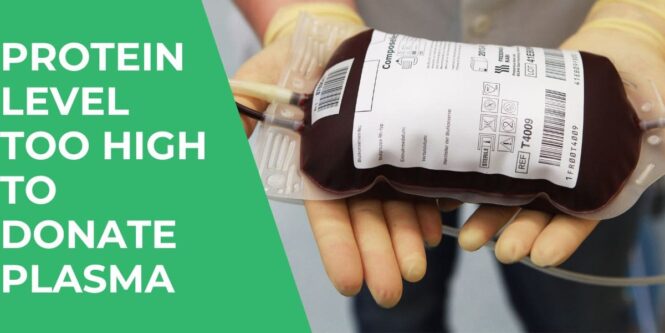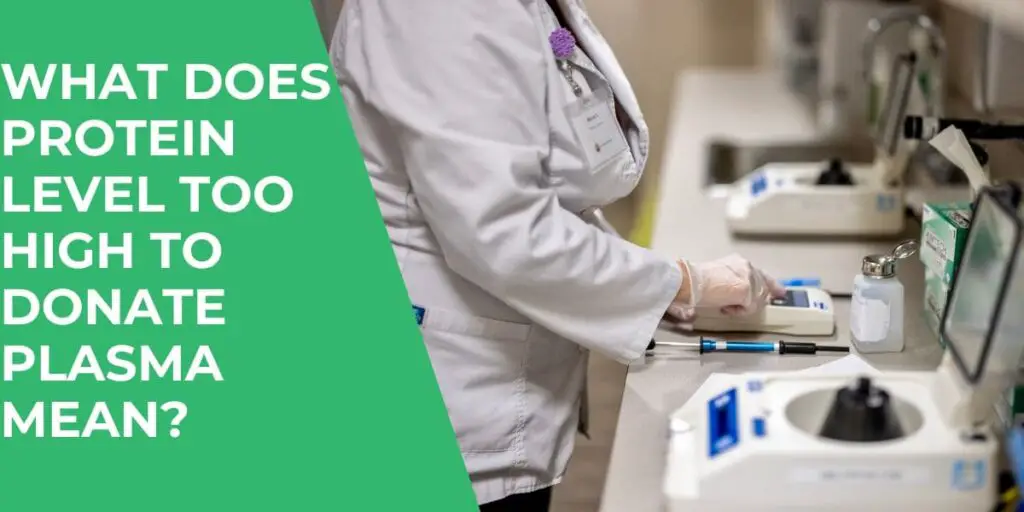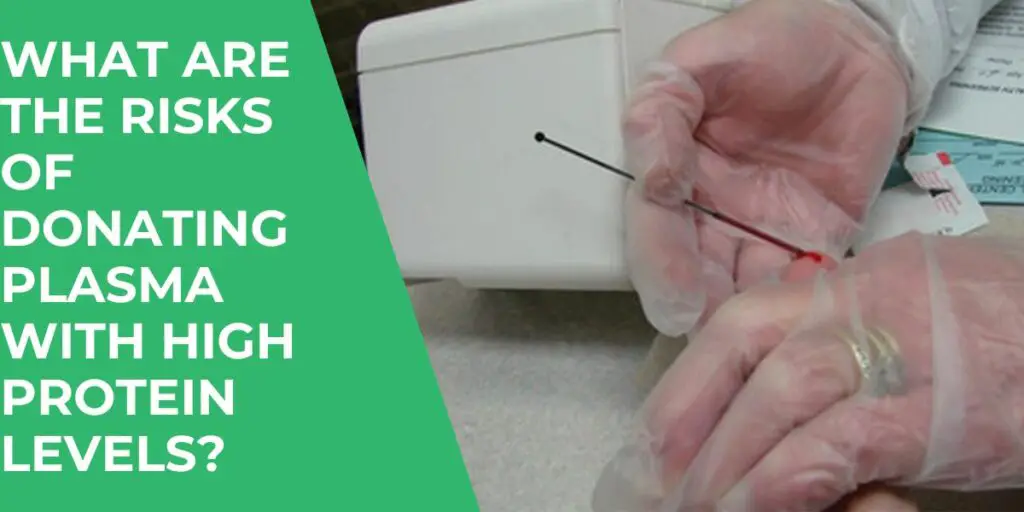
I once took a friend of mine for plasma donation. Unfortunately, he faced an issue of Protein Level Too High to Donate Plasma.
So, I decided to research the Protein Level Too High to Donate Plasma issue.
In this article, I share my knowledge of the reasons behind high protein levels in plasma, its meaning, and the solution.
What Does Protein Level Too High to Donate Plasma Mean?

Protein Level Too High to Donate Plasma means an excessive amount of protein is in your blood. This could be an indication of an underlying health issue or dehydration.
Check my post on Does Donating Plasma Leave Scars? to discover how to prevent scarring after plasma donation.
Can You Donate Plasma With High Protein Levels?
If you have a high protein level in your blood, you won’t be able to donate plasma. Donating plasma requires a specific range of protein levels. If they’re too high, it could indicate an underlying health issue or dehydration.
Solution for Protein Level Too High to Donate Plasma
Follow these solutions for Protein Level Too High to Donate Plasma:
- Cut back on high-protein foods: If you consume foods rich in protein, like meat, eggs, and dairy products, in large amounts, try reducing your intake.
- Choose plant-based protein sources: Opt for plant-based proteins such as beans, lentils, nuts, and seeds. These options are lower in protein compared to animal-based sources. They are also high in fiber and other essential nutrients.
- Increase your water intake: Drinking more water can help flush out excess protein from your body. Take at least eight glasses of water per day.
- Avoid protein supplements: Protein supplements such as whey protein powder and bars are often high in protein and can contribute to elevated protein levels.
- Consult with a dietitian: A registered dietitian can help you create a personalized diet plan to meet your nutritional needs while addressing your high protein levels.
Causes of High Protein Levels in Plasma Donation
These are the causes of High Protein Levels in Plasma Donation:
- Dehydration: If dehydrated, your body may produce more concentrated plasma, increasing protein levels.
- Kidney disease: When your kidneys are not functioning correctly, they may be unable to filter out excess protein, resulting in high protein levels in the blood.
- Inflammation or infection: Inflammation or infection in the body can trigger the immune system to produce more protein.
- Malnutrition: Malnutrition or a diet high in protein can also contribute to high protein levels in the blood.
- Genetic disorders: Certain genetic disorders, such as multiple myeloma and amyloidosis, can cause abnormal protein production in the body, leading to elevated protein levels.
- Medications: Certain medications like steroids and hormone replacements can also increase protein levels in the blood.
Understanding Protein Level in Plasma Donation
Plasma refers to the liquid part of the blood, which contains various proteins like albumin, immunoglobulins, and clotting factors.
During plasma donation, a small amount of plasma is collected from your blood, processed, and used to make life-saving therapies for patients.
Here’s how protein levels come into play during plasma donation:
- High protein levels: If your protein levels are too high, it can indicate an underlying medical condition or a diet high in protein. Donating plasma with high protein levels can put the recipient of the plasma-derived therapies at risk for adverse reactions.
- Low protein levels: On the other hand, if your protein levels are too low, your plasma may not be suitable for plasma-derived therapies as it may not contain enough necessary proteins.
Protein levels are crucial in plasma donation, determining whether your plasma is suitable for plasma-derived therapies.
Maintaining a healthy balance of protein in your body is essential for both your health and that of the patients receiving plasma-derived treatments.
Discover these Tricks to Donate Plasma Faster.
What Are the Risks of Donating Plasma With High Protein Levels?

Some potential risks of donating plasma with high protein levels include:
- Allergic reactions: Plasma-derived therapies can cause allergic reactions in some recipients. High levels of specific proteins in the donated plasma can increase the risk of allergic reactions.
- Blood clots: Elevated protein levels in the donated plasma can increase the risk of blood clots in the recipient.
- Hemolysis: This has to do with the breakdown of red blood cells. If the donated plasma contains high levels of certain proteins, it can cause hemolysis in the recipient.
- Renal failure: Donating plasma with high protein levels can strain the recipient’s kidneys, leading to renal failure.
- Transmission of infectious diseases: If the donor has an underlying medical condition causing high protein levels, there is a risk of transmitting infectious diseases to the recipient.
What is the Normal Range of Protein Level for Plasma Donation?
The normal range of protein levels for plasma donation is between 6.0 and 8.3 grams per deciliter (g/dL).
Why is Protein Level Important in Plasma Donation?
Some of the reasons why protein levels are important in plasma donation include the following:
- Plasma-derived therapies: Plasma-derived therapies treat various medical conditions, including immune deficiencies, bleeding disorders, and neurological disorders. The efficacy of these therapies depends on the levels of specific proteins in the plasma.
- Quality control: Plasma donation centers follow strict guidelines to ensure the safety and quality of plasma-derived therapies. One of these guidelines is to test the donor’s plasma for protein levels. Plasma with high or low protein levels may not be suitable for plasma-derived therapies.
- Donor safety: Donating plasma with high protein levels can put the donor at risk for adverse reactions. Maintaining a healthy balance of protein in your body is essential to ensure that your plasma is suitable for donation.
- Patient safety: Donating plasma with high protein levels can put the recipient of the plasma-derived therapies at risk for adverse reactions. It’s crucial to ensure that the donated plasma contains the necessary proteins and is safe for the patient.
Frequently Asked Questions
The following are the frequently asked questions on Protein Level Too High to Donate Plasma:
Can I Still Donate Plasma if I Have High Protein Level?
If your protein levels are too high, you cannot donate plasma.
Do I Have to Lower My Protein Level for Plasma Donation?
If your protein levels are too high, you may need to lower them to be eligible to donate plasma. You can achieve this through dietary changes and exercise.
How Long Does It Take for Protein Level to Return to Normal Range?
Protein levels could take days, weeks, or even months to return to normal. It depends on the underlying cause.
Can donating plasma affect muscle growth? Find out in my Does Donating Plasma Affect Muscle Growth article.
Conclusion
Having a Protein Level Too High to Donate Plasma can be a hindrance when it comes to donating plasma.
However, it’s essential to understand the underlying reasons for your high levels and to explore your options for helping others.
Whether adjusting your diet, seeking medical treatment, or exploring alternative ways to donate, there are ways to make a difference.
Remember, donating plasma can save lives, and your willingness to give is greatly appreciated. If you still need help proceeding, please get in touch with your healthcare provider or a plasma donation center for guidance.
